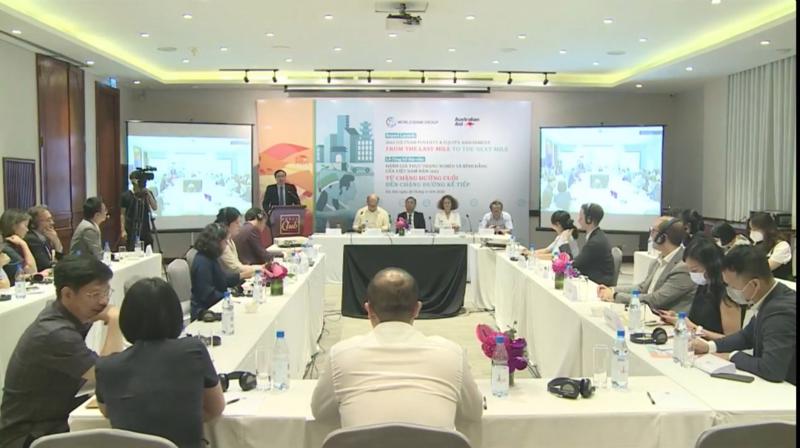On April 28, the World Bank (WB) in Vietnam launched a report entitled “From the Last Mile to the Next Mile: 2022 Vietnam Poverty and Equity Assessment”, which provides insights into poverty and equality in Vietnam in recent times. The launch was held both in-person and online with the participation of Ms. Carolyn Turk, Country Director for the WB in Vietnam, WB economists, and other analysts.
The main focus of the report is Vietnam’s achievements on the road to reducing poverty as well as the country’s path to the future where not only poverty but also economic inequality will be lessened.
Vietnam’s poverty rate has fallen impressively over the last decade. Based on the WB’s lower-middle income country (LMIC) poverty line, poverty in the country declined from 16.8 per cent in 2010 to 5 per cent in 2020. Most income groups have the same pathway out of poverty, while many households were able to escape poverty within a generation. Some groups were even able to climb to higher economic classes.
However, the report also pointed out that inequality increased marginally in the second half of the decade. While richer households tended to consume more in this period, poorer ones spent less and focused on low-income agricultural activities, which means bigger gaps in consumption and equality. It was also noted that the unexpected breakout of Covid-19 has negatively impacted the progress of poverty reduction and even highlighted pre-existing inequalities.
At the launch, economists and analysts discussed the achievements of Vietnam’s poverty reduction program and suggested pathways for the future that will focus on lessening inequalities and improving the country’s income ranking.
In order to help it achieve upper-middle and high-income status, Mr. Matthew Wai-Poi, Lead Economist on Poverty and Equity at the WB, touched on concerns for the country.
Firstly, it should pay more attention to human capital and education. Vietnam has been doing well in terms of improving its human capital, but quality distribution is poor among ethnic minority groups and regions. He suggested that Vietnam do its best to provide education for people of all classes in order to eradicate multi-generational poverty.
Secondly, Vietnam should maintain its capacity in economic transformation. The country should pay attention to increasing work efficiency, which will result in higher pay. It should also take greater advantage of its young population.
Thirdly, the population should be prepared and be able to protect themselves from both idiosyncratic shocks that first affect specific households and then society, and covariate shocks, which have an effect on a large scale. The country’s spending on social security, which mainly supports citizens from shocks, is low compared to other countries with similar income levels and needs to be improved.
Finally, Mr. Wai-Poi emphasized the need to prepare financial resources for the future. He suggested that the government use different fiscal policies as a key government instrument that can enable inclusive prosperity in both the short and long terms. There is significant potential for Vietnam’s fiscal policy to do more in terms of investing for inclusive growth by adopting lessons from other countries.
Vietnam needs to focus on tackling poverty among groups with persistently high poverty rates as the “Last Mile Challenge”, and then hit the road to upper-middle and high-income country status in the “Next Mile”, the launch heard.









 Google translate
Google translate